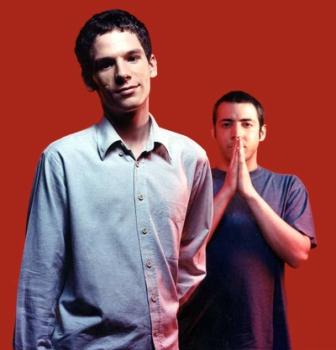Your correspondent is still a young man and reluctant to sound like an old fogey. But we remember when being number one in the UK singles charts seemed to mean something. It didn't necessarily mean that the single was any good - just that it had seeped into the mainstream consciousness enough to reach that milestone. Today, 'UK number one single' doesn't have the same air of cultural significance that it had even in Ireland. There are a number of possible reasons for this, commercial and technological and sociological, but the most likely is that when Westlife do something 14 times and Boyzone six times it no longer feels like something worth doing.
 So far in 2009 a Frenchman has done it twice. Superstar DJ David Guetta (right) topped both the UK and Irish charts for the first time in June with 'When Love Takes Over', featuring Kelly Rowland on vocals. He repeated the UK part of that trick in August with Akon up front, on 'Sexy Chick', which at the time of writing has not made number one in Ireland.
So far in 2009 a Frenchman has done it twice. Superstar DJ David Guetta (right) topped both the UK and Irish charts for the first time in June with 'When Love Takes Over', featuring Kelly Rowland on vocals. He repeated the UK part of that trick in August with Akon up front, on 'Sexy Chick', which at the time of writing has not made number one in Ireland.
While French footballers have thrived cross-channel, their pop counterparts seem to struggle as soon as they hit Dover - or even when they continue on to Rosslare. Guetta is only the fourth French artist to take a song to the UK number one spot, which means that only five Gallic singles have topped Her Majesty's charts. In Ireland too only five French singles have gone to uimhir a h-aon - but not always the same songs that reached Britain's top position. Seeing as you asked, here they are.
You should know the first because it's one of the most notorious singles ever: 'Je T'aime (Moi Non Plus)' by Serge Gainsbourg and Jane Birkin. Banned by the BBC because of Birkin's suggestive sound effects on the fade-out (the lyrics are relatively unerotic and in any case are in French), it went to number one in Britain on 7 October 1969 for one week, having stalled at number two in Ireland the previous month. A throwaway composition originally recorded with Brigitte Bardot, it was Gainsbourg's only hit in the UK - a matter of frustration for an anglophile who recorded most of his classic late-60s songs in London. The great man is therefore, from a British point of view, just a one-hit-wonder - and only then because of his British partner's non-musical contribution.
'Je T'aime (Moi Non Plus)' is remarkable for another piece of UK chart trivia. It was originally pressed and released in Britain by Fontana Records, who got scared by the subsequent controversy and dropped the single despite the fact that it had reached number two in the charts. Gainsbourg arranged to have the single re-released on the small Major Minor label, and it's this latter edition that made the final ascent to number one. But there were still enough copies of the Fontana release on sale for that version to linger lower in the charts while the Major Minor edition was on top. So, 'Je T'aime (Moi Non Plus)' by Serge Gainsbourg and Jane Birkin is the only single to occupy two places in the same week's UK chart. (Remember that for some future pub quiz.)
The next French chart-topper was much less controversial - but perhaps also less French because it's in English. In the summer of 1974 'She' by old-school crooner Charles Aznavour spent four weeks at number one in Britain and one week in Ireland. You may know the song from Elvis Costello's version on the soundtrack to 'Notting Hill'. Aznavour, a likeable sort with a distinctive warbling voice, was already (and still is) a star in France and had a sizeable international following - but, oddly, 'She' wasn't a success in his home country. He now lives in Switzerland: his parents were Armenian and he is Armenia's ambassador to Switzerland and delegate to the United Nations in Geneva.
No French single topped the UK charts during the 1980s. But in Ireland we had two French number ones that decade. However, be we French or Irish, let's not get too proud here. In mid-October 1981 our number one single was 'Hands Up' by Ottowan, whose other big hit was 'D.I.S.C.O'. Ottowan's singles were co-written and produced by Daniel Vangarde - who happens to be the father of Thomas Bangalter from Daft Punk. The royalties from Ottowan's hits no doubt kept young Thomas in pocket money for synthesisers and music lessons: without 'D.I.S.C.O.' by Ottowan there might never have been Daft Punk.
Incredibly, the second French number one in Ireland during the 1980s is much worse: ghastly synth-ballad 'Words' by F.R. David spent a shocking five weeks as our official favourite song in 1983. But then perhaps some French marketing guy had done his research, found that we were the country of Chris de Burgh and simply let us have it.
There was no French chart success on either island during the late '80s and most of the 1990s. Both Black Box, with 1989's 'Ride On Time', and Eiffel 65, makers of the irritating chart-topper 'Blue', were Italian groups sometimes mistakenly considered French. (Black Box's French frontperson, Catherine Quinol, was later revealed to have been miming Milli Vanilli-style to session singers.) A near miss on both sides of the Irish Sea was the 1998 hit 'Music Sounds Better With You' by Stardust, a side project of (hey!) Thomas Bangalter from Daft Punk.
Finally, in March 1999, a French act ruled Britannia (but not Hibernia) again - though under strange circumstances. 'Flat Beat' by Parisian DJ Mr Oizo ('pronounced 'wazzo' like the French word for 'bird', 'oiseau') was featured in a jeans commercial starring a furry yellow puppet called Flat Eric. This was the period when the soundtrack songs of this brand's ads were guaranteed to top the charts. And the title 'Flat Beat' is a perfect description of this numbingly repetitive track.
 Mr Oizo is still making music. Last year he released an album called 'Lamb's Anger', the cover of which featured Flat Eric having his eyeball slit open by a razor blade. Strange, indeed.
Mr Oizo is still making music. Last year he released an album called 'Lamb's Anger', the cover of which featured Flat Eric having his eyeball slit open by a razor blade. Strange, indeed.
France didn't have to wait very long for its first UK and Irish number one of the 21st century. In September 2000 Modjo (left) topped both charts with the catchy dancefloor pop of 'Lady' (video at the end of this article), built around a sample from 'Soup For One' by the mighty Chic. Modjo were a Parisian duo: Romain Tranchart making the music and Yann Destagnol providing the vocals. They followed up 'Lady' with an album but never enjoyed the same success again.
And that brings us up to 2009 and Guetta's chart-toppers.
No French act has yet had a UK number one album - Daft Punk's 'Discovery' got to number two in 2000, while Guetta's current album 'One Love' has so far peaked at number two as well. But Air's 'Talkie Walkie' was Ireland's number one album for two weeks in early 2004.
(UK chart statistics courtesy of www.theofficialcharts.com; Irish chart statistics courtesy of www.irishcharts.ie, a fantastic resource that has the seal of approval from the great Larry Gogan. All hail Larry.)
We've already featured 'Je T'aime (Moi Non Plus)' on this blog before so here's 'Lady' by Modjo, which we find rather charming:
More ...
[Read More...]